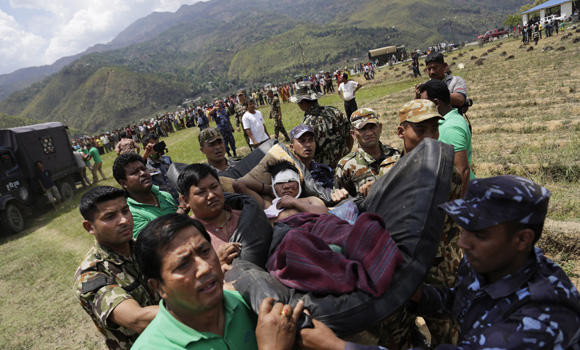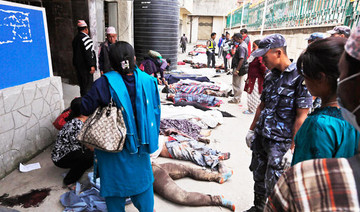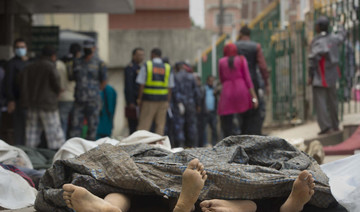KATMANDU: Shelter, fuel, food, medicine, power, news, workers — Nepal’s earthquake-hit capital was short on everything Monday as its people searched for lost loved ones, sorted through rubble for their belongings and struggled to provide for their families’ needs. In much of the countryside, it was worse, though how much worse was only beginning to become apparent.
The death toll soared past 3,700, even without a full accounting from vulnerable mountain villages that rescue workers were still struggling to reach two days after the disaster.
Udav Prashad Timalsina, the top official for the Gorkha district, where Saturday’s magnitude 7.8 quake was centered, said he was in desperate need of help.
“There are people who are not getting food and shelter. I’ve had reports of villages where 70 percent of the houses have been destroyed,” he said.
Aid group World Vision said its staff members were able to reach Gorkha, but gathering information from the villages remained a challenge. Even when roads are clear, the group said, some remote areas can be three days’ walk from Gorkha’s main disaster center.
Some roads and trails have been blocked by landslides, the group said in an e-mail to The Associated Press. “In those villages that have been reached, the immediate needs are great including the need for search and rescue, food items, blankets and tarps, and medical treatment.”
Timalsina said 223 people had been confirmed dead in Gorkha district but he presumed “the number would go up because there are thousands who are injured.” He said his district had not received enough help from the central government, but Jagdish Pokhrel, the clearly exhausted army spokesman, said nearly the entire 100,000-soldier army was involved in rescue operations.
“We have 90 percent of the army out there working on search and rescue,” he said. “We are focusing our efforts on that, on saving lives.”
Saturday’s magnitude 7.8 earthquake spread horror from Katmandu to small villages and to the slopes of Mount Everest, triggering an avalanche that buried part of the base camp packed with foreign climbers preparing to make their summit attempts.
Aid is coming from more than a dozen countries and many charities, but Lila Mani Poudyal, the government’s chief secretary and the rescue coordinator, said Nepal needed more.
He said the recovery was also being slowed because many workers — water tanker drivers, electricity company employees and laborers needed to clear debris — “are all gone to their families and staying with them, refusing to work.”
“We are appealing for tents, dry goods, blankets, mattresses, and 80 different medicines that the health department is seeking that we desperately need now,” Poudyal told reporters. “We don’t have the helicopters that we need or the expertise to rescue the people trapped.”
As people are pulled from the wreckage, he noted, even more help is needed.
“Now we especially need orthopedic (doctors), nerve specialists, anaesthetists, surgeons and paramedics,” he said. “We are appealing to foreign governments to send these specialized and smart teams.”
More than 6,300 people were injured in the quake, he said, estimating that tens of thousands of people had been left homeless. “We have been under severe stress and pressure, and have not been able to reach the people who need help on time,” he said.
Nepal police said in a statement that the country’s death toll had risen to 3,617 people. That does not include the 18 people killed in the avalanche, which were counted by the mountaineering association. Another 61 people were killed in neighboring India, and China reported 20 people dead in Tibet.
Well over 1,000 of the victims were in Katmandu, the capital, where an eerie calm prevailed Monday.
Tens of thousands of families slept outdoors for a second night, fearful of aftershocks that have not ceased. Camped in parks, open squares and a golf course, they cuddled children or pets against chilly Himalayan nighttime temperatures.
They woke to the sound of dogs yelping and jackhammers. As the dawn light crawled across toppled building sites, volunteers and rescue workers carefully shifted broken concrete slabs and crumbled bricks mixed together with humble household items: pots and pans; a purple notebook decorated with butterflies; a framed poster of a bodybuilder; so many shoes.
“It’s overwhelming. It’s too much to think about,” said 55-year-old Bijay Nakarmi, mourning his parents, whose bodies recovered from the rubble of what once was a three-story building.
He could tell how they died from their injuries. His mother was electrocuted by a live wire on the roof top. His father was cut down by falling beams on the staircase.
He had last seen them a few days earlier — on Nepal’s Mothers’ Day — for a cheerful family meal.
“I have their bodies by the river. They are resting until relatives can come to the funeral,” Nakarmi said as workers continued searching for another five people buried underneath the wreckage.
Katmandu district chief administrator Ek Narayan Aryal said tents and water were being handed out Monday at 10 locations in Katmandu, but that aftershocks were leaving everyone jittery. The largest, on Sunday, was magnitude 6.7.
“There have been nearly 100 earthquakes and aftershocks, which is making rescue work difficult. Even the rescuers are scared and running because of them,” he said.
“We don’t feel safe at all. There have been so many aftershocks. It doesn’t stop,” said Rajendra Dhungana, 34, who spent Sunday with his niece’s family for her cremation at the Pashuputi Nath Temple.
Acrid, white smoke rose above the Hindu temple, Nepal’s most revered. “I’ve watched hundreds of bodies burn,” Dhungana said.
The capital city is largely a collection of small, poorly constructed brick apartment buildings. The earthquake destroyed swaths of the oldest neighborhoods, but many were surprised by how few modern structures collapsed in the quake.
On Monday morning, some pharmacies and shops for basic provisions opened while bakeries began offering fresh bread. Huge lines of people desperate to secure fuel lined up outside gasoline pumps, though prices were the same as they were before the earthquake struck.
With power lines down, spotty phone connections and almost no Internet connectivity, residents were particularly anxious to buy morning newspapers.
Pierre-Anne Dube, a 31-year-old from Canada, has been sleeping on the sidewalk outside a hotel. She said she’s gone from the best experience of her life, a trek to Everest base camp, to the worst, enduring the earthquake and its aftermath.
“We can’t reach the embassy. We want to leave. We are scared. There is no food. We haven’t eaten a meal since the earthquake and we don’t have any news about what’s going on,” she said.
The earthquake was the worst to hit the South Asian nation in more than 80 years. It and was strong enough to be felt all across parts of India, Bangladesh, China’s region of Tibet and Pakistan. Nepal’s worst recorded earthquake in 1934 measured 8.0 and all but destroyed the cities of Katmandu, Bhaktapur and Patan.
The quake has put a huge strain on the resources of this impoverished country best known for Everest, the highest mountain in the world. The economy of Nepal, a nation of 27.8 million people, relies heavily on tourism, principally trekking and Himalayan mountain climbing.
___
Associated Press writers Muneeza Naqvi and Tim Sullivan in New Delhi contributed to this report.
Quake-aid need acute in Nepal; toll still soaring
Quake-aid need acute in Nepal; toll still soaring

Investigators not ruling out sabotage in Air India crash

- Air India’s Boeing 787 Dreamliner crashed soon after take-off from Ahmedabad on June 12
- Minister of state for civil aviation says probe materials include 30 days of city CCTV footage
NEW DELHI: Indian investigators are not ruling out sabotage in connection with the crash of the London-bound Air India flight that killed at least 260 people earlier this month, a minister has said, as officials began examining the plane’s black box.
The London-bound Boeing 787-8 Dreamliner crashed less than a minute after taking off from Ahmedabad airport in the western Indian state of Gujarat on June 12.
The Ministry of Civil Aviation has confirmed that investigators had recovered from the crash site both components of the black box — the cockpit voice recorder and flight data recorder — and brought them to the Aircraft Accident Investigation Bureau in New Delhi last week.
“Right now, the investigation is ongoing. But this is a rare incident. It has never happened before that both the engines got shut at the same time,” Murlidhar Mohol, minister of state for civil aviation, told the media on Saturday evening.
He did not dismiss the possibility of “sabotage” when New Delhi Television asked if it was being considered.
“We are investigating it from all angles to find out what was the cause of this accident,” Mohol said.
“We are looking at CCTV footage of Ahmedabad over the last 30 days, (of) those who came, those who went through screening, all the passports — we are probing it from all the angles.”
Data from the black box has been downloaded and the final report was expected in three months.
“Was it due to a bird strike, was there some technical issue with the engine, was there a fuel-supply issue, why both the engines shut down at the same time ... we will know only after the investigation,” the minister said, adding that the black box would be investigated domestically and “there is no need to send it abroad.”
The Air India flight was carrying 242 people — 230 passengers, two pilots and 10 crew members. Only one person, a British national sitting in an emergency exit seat, survived the crash.
It was initially unclear how many more people were killed on the ground as the aircraft fell on the B. J. Medical College and hostel for students and resident doctors of the Ahmedabad Civil Hospital.
After two weeks of DNA testing, authorities in Gujarat state announced on Saturday the final toll, saying they had recovered 260 bodies.
The number is lower than the initial number reported by the Junior Doctors’ Association at the B. J. College, whose president told the media a day after the crash that the hospital had received the bodies of 270 victims.
Bus crash blaze kills 38 in Tanzania

DAR ES SALAAM: A collision between a bus and minibus in Tanzania has killed 38 people after both vehicles were set on fire by the crash, the presidency said Sunday.
The accident in Sabasaba, in the Kilimanjaro region, on Saturday evening occurred after one of the bus’s tires punctured, causing the driver to lose control.
“A total of 38 people died in the crash, including two women,” a presidency statement said, adding that 28 others were wounded.
“However, due to the extent of the burns, 36 bodies remain unidentified,” the presidency said.
Six of the injured were still in hospital for treatment, it added.
Deadly crashes are frequent on Tanzania’s roads.
In a 2018 report, the World Health Organization estimated that 13,000 to 19,000 people in Tanzania were killed in traffic accidents in 2016, far higher than the government’s official toll of 3,256.
EU must be more assertive with Israel: Ex-foreign policy chief

- Josep Borrell: Europe has been ‘relegated to the sidelines’ in mediating conflict
- Country ‘carrying out the largest ethnic-cleansing operation since end of Second World War’
LONDON: The EU must adopt a more assertive posture against Israel over its violations of international law in Gaza, Josep Borrell, the bloc’s former foreign policy chief, has said.
In an article for Foreign Affairs magazine, Borrell argued that the EU has a “duty” to intervene over the humanitarian catastrophe in the Palestinian enclave, The Guardian reported.
Rather than relying on the US to bring an end to the war, Europe must launch its own plan, he said.
The article was co-authored with Kalypso Nicolaidis, a Franco-Greek academic who has advised the EU.
“Europe can no longer afford to linger at the margin. The EU needs a concerted plan,” the two authors said.
“Not only is Europe’s own security at stake, but more important, European history imposes a duty on Europeans to intervene in response to Israel’s violations of international law.
“Europeans cannot stay the hapless fools in this tragic story, dishing out cash with their eyes closed.”
Borrell’s successor, Kaja Kallas, said last week that it was “very clear” Israel had breached its human rights commitments during its war on Gaza.
However, the “concrete question” remains the choice of action EU member states can agree on in response, she added.
Last month, 17 EU member states, in protest against Israel’s blockade of humanitarian aid to Gaza, triggered a review of the bloc’s association agreement with Israel, which covers trade and other cooperation.
Borrell last month accused Tel Aviv of “carrying out the largest ethnic-cleansing operation since the end of the Second World War.”
Europe’s inconsistent response to the humanitarian crisis can be partly explained by the reluctance of some countries — including Germany, Hungary and Austria — to take action against Israel for historical reasons, Borrell and Nicolaidis wrote.
Yet there are ways for other EU member states to take action without requiring a continent-wide consensus, they said, highlighting the EU’s financial leverage and the utility of European programs for Israel, including the Erasmus student exchange scheme.
EU member states could also invoke Article 20 of the EU’s treaty to “allow for at least nine member states to come together to utilize certain foreign policy tools not related to defense,” they wrote.
“Because such an action has never been taken before, those states would have to explore what (it) … would concretely allow them to do,” the Foreign Affairs article said.
The EU has been rendered ineffective in applying pressure due to disunity, the two authors said, arguing that the bloc should act as a powerful mediator in the Middle East.
“Some EU leaders cautiously backed the International Criminal Court’s investigations, while others, such as Austria and Germany, have declined to implement its arrest warrants against Israeli officials,” they wrote.
“And because EU member states, beginning with Germany and Hungary, could not agree on whether to revisit the union’s trade policy with Israel, the EU continues to be Israel’s largest trading partner.
“As a result, the EU, as a bloc, has been largely relegated to the sidelines, divided internally and overshadowed in ceasefire diplomacy by the US and regional actors such as Egypt and Qatar. Shouldn’t the EU also have acted as a mediator?”
Ukraine on track to withdraw from Ottawa anti-personnel mines treaty, lawmaker says

KYIV: Ukraine’s President Volodymyr Zelensky has signed a decree on the country’s withdrawal from the Ottawa Convention, which bans the production and use of anti-personnel mines, a senior Ukrainian lawmaker said on Sunday.
Ukraine ratified the convention in 2005 and a parliamentary decision is needed to withdraw from the treaty.
The document is not yet available on the website of the president’s office.
“This is a step that the reality of war has long demanded. Russia is not a party to this Convention and is massively using mines against our military and civilians,” Roman Kostenko, secretary of the Ukraine parliament’s committee on national security, defense and intelligence, said on his Facebook page.
“We cannot remain tied down in an environment where the enemy has no restrictions,” he added, saying that the legislative decision must definitively restore Ukraine’s right to effectively defend its territory.
Russia has intensified its offensive operations in Ukraine in recent months, using significant superiority in manpower.
Kostenko did not say when the issue would be debated in parliament.
Germany seeks Israeli partnership on cyberdefense, plans ‘cyber dome’

BERLIN: Germany is aiming to establish a joint German-Israeli cyber research center and deepen collaboration between the two countries’ intelligence and security agencies, German Interior Minister Alexander Dobrindt said on Sunday.
Germany is among Israel’s closest allies in Europe, and Berlin has increasingly looked to draw upon Israel’s defense expertise as it boosts its military capabilities and contributions to NATO in the face of perceived growing threats from Russia and China.
“Military defense alone is not sufficient for this turning point in security. A significant upgrade in civil defense is also essential to strengthen our overall defensive capabilities,” Dobrindt said during a visit to Israel, as reported by Germany’s Bild newspaper.
Dobrindt, who was appointed by new German Chancellor Friedrich Merz last month, arrived in Israel on Saturday.
According to the Bild report, Dobrindt outlined a five-point plan aimed at establishing what he called a “Cyber Dome” for Germany, as part of its cyberdefense strategy.
Earlier on Sunday, Bavarian Prime Minister Markus Soeder called for the acquisition of 2,000 interceptor missiles to equip Germany with an “Iron Dome” system similar to Israel’s short-range missile defense technology.
























